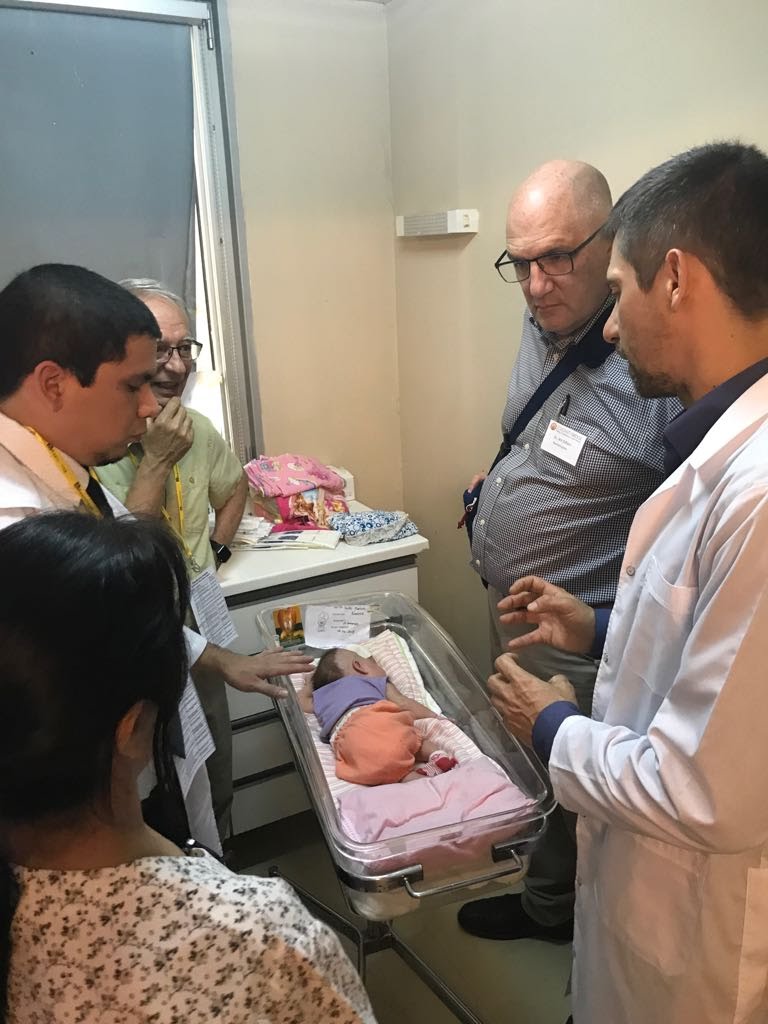Pushing the Envelope
Written by Lindsay Doucette
The phrase “pushing the envelope” comes from the lingo of test pilots in the early US space program whose job consisted of pushing and extending the theoretical limits of what was considered possible. It comes from a field that involves complex scientific parameters, incredible skill, courage, risk, and a sober realization of what’s at stake.
“Pushing the envelope” was the title of neurosurgeon Dr. Richard Moser’s introductory lecture to a two-day course held last week at the National Hospital of Itaguá, just outside of Asunción, Paraguay. Approaching, extending, and exceeding the limits of what is considered possible is at the heart of Dr. Moser’s work as medical director of the Solidarity Bridge neurosurgery program.
This thread of “pushing the envelope” was consistent throughout the week-long neurosurgery mission that consisted of mentored surgeries, patient consultations, meetings with hospital leaders and course instruction in both Bolivia and Paraguay.
In meetings with Bolivian and Paraguayan neurosurgeons, Dr. Moser pushed at the edges of possibility, asking questions like “What is your vision for the future? What’s going to make an impact? How can Solidarity Bridge support that vision?”
The neurosurgical communities in Bolivia and Paraguay are working hard to advance their field from where they stand, working against many obstacles, and yet with much to celebrate. At the beginning of the week, the Neuro team visited the Belga Hospital in Cochabamba, a long-time partner of Solidarity Bridge and Puente de Solidaridad in the provision of pediatric open heart surgeries for low-income families. The hospital has undergone extensive renovations in the past two years, with newly equipped operating rooms, the development of an epilepsy monitoring center (through support from Solidarity Bridge and its partners), and the acquisition of a Brain Lab neuronavigation system that will help to optimize neurosurgical services through enhanced navigation and visualization. Missioners, including Dr. Moser and Dr. Barbara Lazio, were invited to speak at a dinner hosted by the leadership of the Belga Hospital to celebrate these achievements.
Dr. Moser congratulated the Belga Hospital leadership for their investments in the field of neurosurgery, but also asked the question, “now that you have the instruments, what are you going to do with them?” He encouraged them to develop vision and value propositions to ensure that their investments would result in increased access to safe neurosurgical care for all the people of Bolivia.
After a brief stay in Cochabamba, Drs. Moser and Lazio, and Solidarity Bridge staff traveled to Santa Cruz, Bolivia where US neurosurgeon Dr. Art DiPatri was assisting with pediatric neurosurgeries at the Santa Cruz Children’s Hospital. While Drs. DiPatri and Lazio collaborated on a successful surgery on a 5-month-old infant, Dr. Moser and our staff visited the city’s only Cancer Institute, where a concurrent Oncological Surgery Mission Trip was taking place.
The Cancer Institute was celebrating its 40th Anniversary, beginning the day with a special Mass and a celebration with speakers highlighting the many achievements in the hospital’s history. Hospital leaders provided our team with a tour of the clean and brightly-lit facility. There was a definite spirit of mission in this hospital; a drive to provide the best care possible for Bolivian cancer patients in spite of significant limitations in terms of equipment, infrastructure, and financial support. Here, too, there were new developments to celebrate. We were introduced to the hospital’s brand new linear accelerator, an enormous device used to deliver radiation treatments.
After talking at length with the technicians responsible for getting this device up and running, Dr. Moser sat down with the Cancer Institute’s head of neurosurgery, Dr. Luis Alberto Borda. Dr. Borda shared the challenges of practicing neurosurgery at a public hospital in Bolivia. “Do you remember the TV show M*A*S*H from the 1970’s?” he asked. “It’s like that. It’s like operating in war. You do what you can.” Ever the optimist, Dr. Moser chimed in, “What do you need? What would be your first priority?” It’s in these types of collegial exchanges that Solidarity Bridge finds its mission. Pushing the envelope of what seems possible, supporting the work of those who continue to dream in spite of the obstacles, and celebrating every success along the way.
Lindsay Doucette is the Senior Director of Programs for Solidarity Bridge, and is accompanying our neurosurgery team on their March mission trip.
The Program for the Development of Neurosurgery is a partnership of Solidarity Bridge and Puente de Solidaridad. Under the leadership of Dr. Richard Moser and other top US neurosurgeons, we are raising the level of neurosurgery in Bolivia. Our mission teams have been the first to introduce several neurosurgical advancements in the country, while restoring quality of life to patients who had nowhere else to turn for treatment. Plans are also moving forward to form the first Epilepsy Center in Bolivia. Learn more about our Neurosurgery program.


